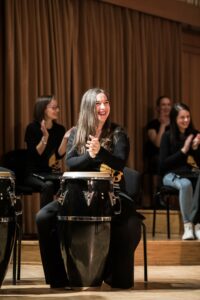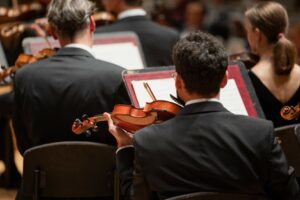Music Is a Universal Language That We All Understand
When I think of the people who are part of the magical story of the Slovenian Philharmonic, the same thought always comes to mind: passion. Passion is precisely what you feel when you cross the threshold of this wonderful building and, for a moment, have the feeling that you too are part of this story. In this sense, musicians are lucky: if you have the great fortune to engage in a profession that is full of passion you certainly live longer. Music stimulates inner awareness and improves our wellbeing and mood. It affects our heart rate, our blood pressure and our breathing, as well as the level of certain hormones, especially stress hormones and endorphins. Music allows the listener to perceive and express his or her feelings, to show or articulate his or her thoughts and moods through non-verbal language. Through music, it’s easier to establish contact with people, because melody, sound and the voice allow us to communicate more freely with the outside world. Since I was a pianist in my youth, I know that music comes to the fore when words are unable to, don’t know how to or don’t want to.

The Philharmonic building also has its own scent. I have to admit that I’m very attentive to scents and I detect the scent in a space before anything else. It’s hard to define what this particular scent is like; I can only say that it is unique. It’s probably the smell of wood, of instruments, of evening dresses, the smell of people who work hard day after day to ensure that music reaches us, in a very special way, and often just when we need it the most. When I first stepped into the magnificent building of the Slovenian Philharmonic, I didn’t think of the piano – the instrument that was waiting for me faithfully at home and that had accompanied me throughout my youth, right up to the end of secondary school – but of the harp. My story with the harp is interesting. I always harboured a desire to touch the harp at least once in my life – and, of course, to play it – but fate decreed otherwise. The sound of the harp promotes the achievement of harmonious balance on a non-physical level, which is the first condition for physical, mental and spiritual health. It’s no coincidence that the harp is a symbol for the mystical journey to the afterlife. In ancient times, poets and bards on the verge of death sang their last song, their so-called “swan song”, to the accompaniment of the harp. I believe it’s no coincidence that I like the harp so much.

If you’ve ever been to the Philharmonic for a concert, then you know that it’s the right place for a journey to another world. Everything contributes to this: the excellent musicians, the atmosphere steeped in history, the stories of composers that hang in the air in their own unique way, and perhaps also a personal desire for time to stand still, at least for a moment. Music has a powerful effect on our brain, and music with a more harmonious or relaxing frequency makes us feel very good. In this regard, there is a well-known theory (albeit yet unproven) stating that relaxing music with a frequency of 528 Hz has a positive effect on our body. Every organ, every cell of our body, absorbs and emits sounds with a particular optimal resonant frequency. The most basic state of vibration is the state of sound. Everything has an optimal range of vibration (frequency) and this frequency is called resonance. When we are in resonance, we are in balance. When we are in the embrace of live music, we are in nirvana. Everything is connected, everything is simple in its own way, if we just let ourselves go and take an hour or so every now and then for an unforgettable concert, and thus also take care of our soul.
